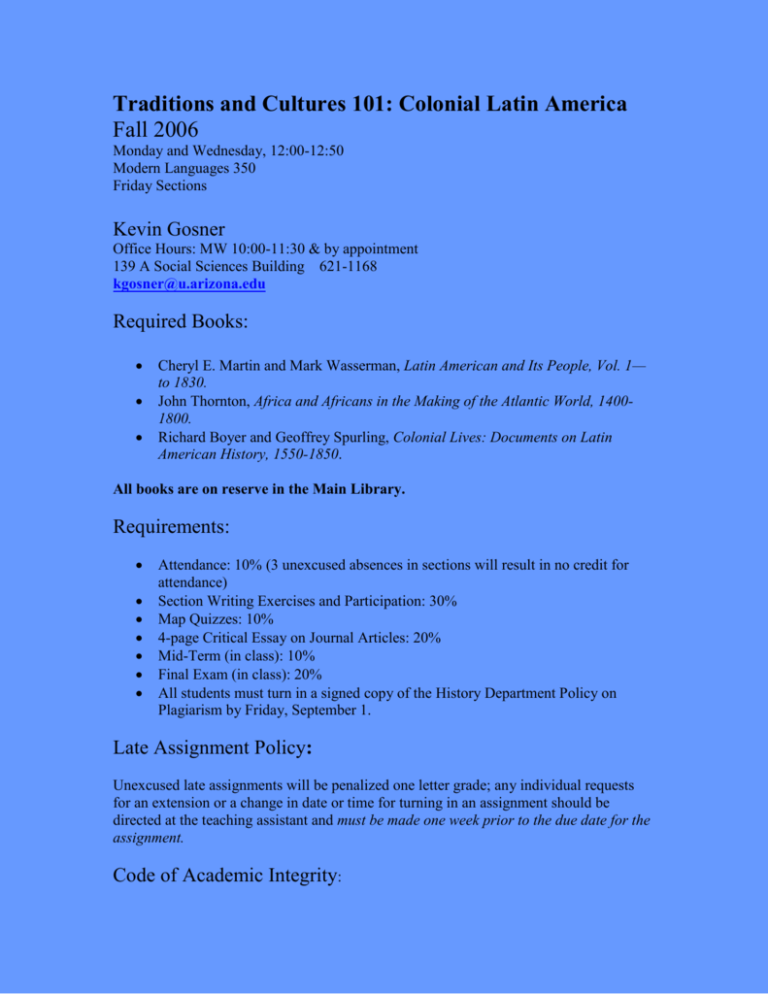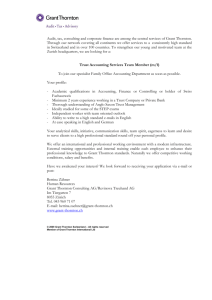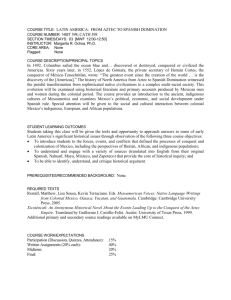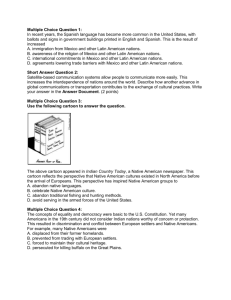Traditions and Cultures 101: Colonial Latin America Fall 2006
advertisement

Traditions and Cultures 101: Colonial Latin America Fall 2006 Monday and Wednesday, 12:00-12:50 Modern Languages 350 Friday Sections Kevin Gosner Office Hours: MW 10:00-11:30 & by appointment 139 A Social Sciences Building 621-1168 kgosner@u.arizona.edu Required Books: Cheryl E. Martin and Mark Wasserman, Latin American and Its People, Vol. 1— to 1830. John Thornton, Africa and Africans in the Making of the Atlantic World, 14001800. Richard Boyer and Geoffrey Spurling, Colonial Lives: Documents on Latin American History, 1550-1850. All books are on reserve in the Main Library. Requirements: Attendance: 10% (3 unexcused absences in sections will result in no credit for attendance) Section Writing Exercises and Participation: 30% Map Quizzes: 10% 4-page Critical Essay on Journal Articles: 20% Mid-Term (in class): 10% Final Exam (in class): 20% All students must turn in a signed copy of the History Department Policy on Plagiarism by Friday, September 1. Late Assignment Policy: Unexcused late assignments will be penalized one letter grade; any individual requests for an extension or a change in date or time for turning in an assignment should be directed at the teaching assistant and must be made one week prior to the due date for the assignment. Code of Academic Integrity: Students are responsible for compliance with all University policies regarding academic integrity as well as with American Historical Association standards for historical scholarship. Read the UA Policy and Procedures Code of Academic Integrity, AHA Statement on Plagiarism, and The History Department Policy on Plagiarism. Schedule of Readings and Lectures: Part One: The Early Modern Atlantic World Aug 21-25: Global Perspectives on Colonial Latin America and Ancient America M&W: 1-58 Aug 28-Sept 1: Spain and Portugal M&W: 58-67; The Barcelona Maritime Code; from John Boswell, The Royal Treasure: Muslim Communities under the Crown of Aragon in the Fourteenth Century, Chapter 6: The Rights of Mudéjares; Synod of Castilian Jews. Sept 6-8: Europe and World Trade before Columbus Thornton: 13-42; Sidi Ali Reis: Mirat ul Memalik Sept 11-15: Africa and the Atlantic World Before 1600 Thornton: 43-97. Sept 18-22: The Spanish Caribbean M&W: 70-75; Christopher Columbus: Selections from Journal and The First Voyage ; Laws of Burgos, 1512-1513. Part Two: The Age of Conquest Sept 25-29: The Conquest of Mexico M&W: 76-84; Hernan Cortés: Second Letter to Charles V, 1520; Documents: Contrast and Comparison Exercises: The Conquest of Mexico.: selections to be assigned by section leader. Oct 2-6: Spaniards in the Southwest of North America The Journey of Alvar Nuñez Cabeza De Vaca (1542); Coronado's Report to Mendoza and Coronado to the King of Spain. Oct 9-13: The Spiritual Conquest M&W: 85-103; B&S: Readings 3-5, 7. Oct 16-20: Indian Population Decline and the African Slave Trade Thornton: 98-151. MID-TERM EXAM IN CLASS MONDAY OCTOBER 16 Part Three: Colonial Peoples Oct 23-27: Land, Labor, and Trade M&W: 105-136; B&S: Readings 1-2, 8. Oct 30-Nov 3: Native Peoples under Spanish Rule M&W: 137-168; The New Laws of the Indies; ; Royal Instructions for the Viceroy. Nov 6- 10: Slavery and African Peoples in Latin America Thornton: 152-205; Webtext: Images of Slavery: selections to be assigned by section leader. Part Four: Power and Resistance Nov 15-17: Race, Culture, and Colonialism M&W: 169-181; Thornton: 206-271. B&S: Readings 14, 19. Nov 20-22: Patriarchy and Power M&W: 182-210; B&S: Readings 9-13; 15; 17-18. CRITICAL ESSAY ON JOURNAL ARTICLES DUE MONDAY NOVEMBER 20 Nov 27-Dec 1: The Age of Revolution M&W: 203-235; Thornton: 272-333; B&S: Readings 20-22. Dec 4-6: Independence and the Legacies of Colonialism M&W: 236-261; Thornton: 304-334; B&S: Reading 23. Final Exam: Wednesday, December 13, 2006 11:00-1:00. Instructions for Critical Essay on Journal Articles: Choosing the topic you want to read about: “Historians are not interested just in what happened and when, although such facts are important to them. They also want to know why events happened and how these events are related.” From A Pocket Guide to Writing in History, by Mary Lynn Rampolla. This assignment should help you understand the economic, social, political, and/or cultural processes that shaped the history of the subject that interests you, and provide an exercise for exploring how historians ask questions, choose concepts and methods, and interpret written records and other sources. The following approaches are common in historical research and may help you to identify a topic for your critical review. Historicizing a problem, or explaining why something took place in a given time and place. For example, why were the Jesuits expelled from Mexico in 1767? Or, why did the silver mines in Potosi decline in the eighteenth century? Or, why did the Inquisition persecute homosexuals more aggressively in the seventeenth century? Regional comparisons. For example, comparing the history of black slaves in the artisan guilds of Mexico City and Lima. Or comparing patterns of Indian resistance in the frontier zones of northern Mexico and southern Chile. Topical comparisons. For example, comparisons of the work of female slaves on tobacco and sugar plantations in eighteenth century Veracruz. Or comparing rates of illegitimacy among different ethnic groups in Mexico City between 1600 and 1750. Studies of cause and effect, or trying to establish links between two or more dimensions of historical change. For example, was rising population in eighteenth century Mexico the product of increasing immunity to certain diseases, changes in the diets of ordinary people, or improvements in public health services, like the construction of urban water fountains? Or, what impact did the easing of trade restrictions by the Bourbons in 1769 have on commerce between Mexico and Cuba? Testing a hypothesis derived from a theoretical or conceptual premise. For example, higher incidences of urban rioting in Bogotá during periods of economic growth were the product of sharper class differences between the rich and the poor. Or, the power of patriarchal authority made it impossible for creole daughters in seventeenth century Venezuela to challenge their father’s choice for a husband. Fact gathering. Though the goal of historical research is interpretation and analysis, new evidence or new information is always welcomed. Empirical research, therefore, remains highly valued by the profession, especially documentation on difficult topics. For example, how did infant mortality rates among black slaves and free mulattos compare in Lima between 1750 and 1820. Or, how much silver was produced in the mines of northern Mexico between 1620 and 1700? Or, what was the price of cotton in Sonora between 1770 and 1820? For your essay, you should: Identify the topic that your three articles examine and explain why it has been of interest to historians. Briefly comment on the time and place that each scholar has written about. Ask yourself: what is significant about the time period under study? Are there particular events that I should discuss? Why do historians choose to write about a particular region? Discuss the concepts and methods that each scholar uses; consider the premises of their argument, including how they define key terms of analysis; ask, is this a work of social history, cultural history, political history, economic history? Is their approach innovative? Discuss points of comparison and contrast in their work, including their use of sources, their framework of interpretation, the historical context for their work, and the conclusions they draw from their evidence. Finally, discuss and evaluate the implications of the three articles for future research on the subject; in other words, try to answer the question, where do we go from here? This website will help you find the articles. We’re very grateful to Ruth Dickstein in the Main Library for putting this together: Guide to Using JSTOR, an online database for researching journal articles by subject and keyword http://www.library.arizona.edu/help/tutorials/courses/trad/101/colonial_latin_america.ht ml FINAL EXAM STUDY QUESTIONS




